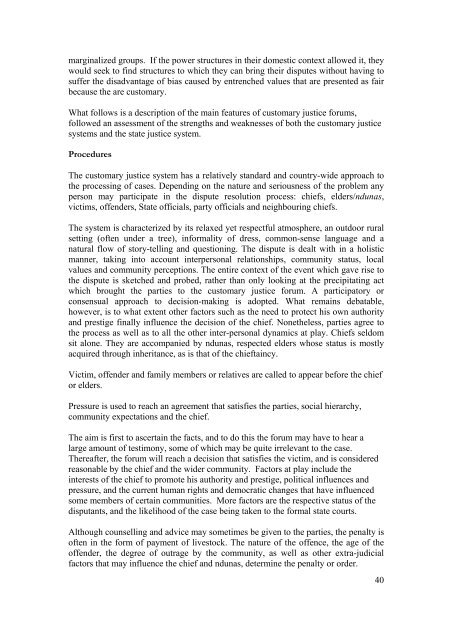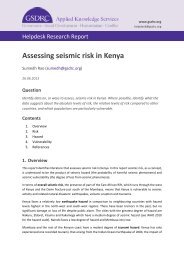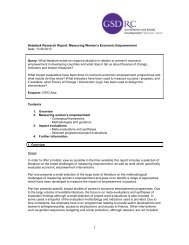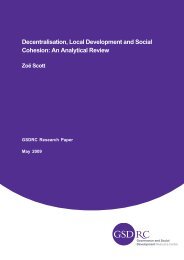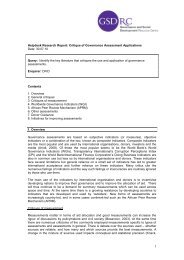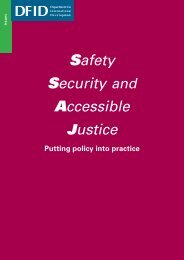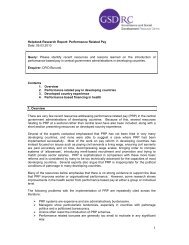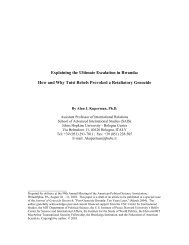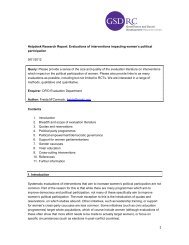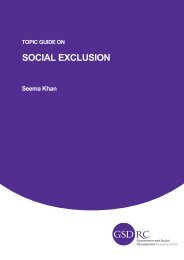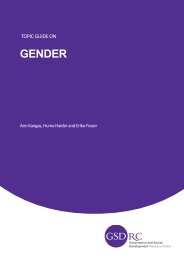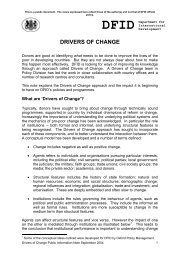ACCESS TO JUSTICE FOR THE POOR OF MALAWI? AN ... - GSDRC
ACCESS TO JUSTICE FOR THE POOR OF MALAWI? AN ... - GSDRC
ACCESS TO JUSTICE FOR THE POOR OF MALAWI? AN ... - GSDRC
- No tags were found...
You also want an ePaper? Increase the reach of your titles
YUMPU automatically turns print PDFs into web optimized ePapers that Google loves.
marginalized groups. If the power structures in their domestic context allowed it, theywould seek to find structures to which they can bring their disputes without having tosuffer the disadvantage of bias caused by entrenched values that are presented as fairbecause the are customary.What follows is a description of the main features of customary justice forums,followed an assessment of the strengths and weaknesses of both the customary justicesystems and the state justice system.ProceduresThe customary justice system has a relatively standard and country-wide approach tothe processing of cases. Depending on the nature and seriousness of the problem anyperson may participate in the dispute resolution process: chiefs, elders/ndunas,victims, offenders, State officials, party officials and neighbouring chiefs.The system is characterized by its relaxed yet respectful atmosphere, an outdoor ruralsetting (often under a tree), informality of dress, common-sense language and anatural flow of story-telling and questioning. The dispute is dealt with in a holisticmanner, taking into account interpersonal relationships, community status, localvalues and community perceptions. The entire context of the event which gave rise tothe dispute is sketched and probed, rather than only looking at the precipitating actwhich brought the parties to the customary justice forum. A participatory orconsensual approach to decision-making is adopted. What remains debatable,however, is to what extent other factors such as the need to protect his own authorityand prestige finally influence the decision of the chief. Nonetheless, parties agree tothe process as well as to all the other inter-personal dynamics at play. Chiefs seldomsit alone. They are accompanied by ndunas, respected elders whose status is mostlyacquired through inheritance, as is that of the chieftaincy.Victim, offender and family members or relatives are called to appear before the chiefor elders.Pressure is used to reach an agreement that satisfies the parties, social hierarchy,community expectations and the chief.The aim is first to ascertain the facts, and to do this the forum may have to hear alarge amount of testimony, some of which may be quite irrelevant to the case.Thereafter, the forum will reach a decision that satisfies the victim, and is consideredreasonable by the chief and the wider community. Factors at play include theinterests of the chief to promote his authority and prestige, political influences andpressure, and the current human rights and democratic changes that have influencedsome members of certain communities. More factors are the respective status of thedisputants, and the likelihood of the case being taken to the formal state courts.Although counselling and advice may sometimes be given to the parties, the penalty isoften in the form of payment of livestock. The nature of the offence, the age of theoffender, the degree of outrage by the community, as well as other extra-judicialfactors that may influence the chief and ndunas, determine the penalty or order.40


